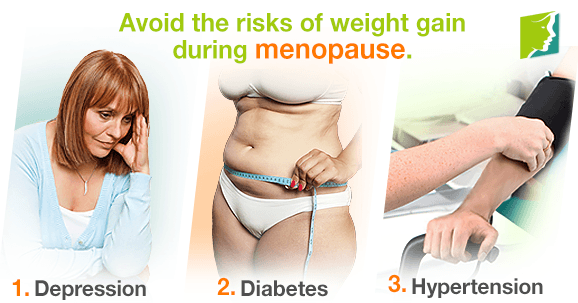Weight gain is a common complaint of menopause, and women who suffer from this symptom will generally start to notice a difference in their forties. This is due to a number of reasons, including natural decrease in physical activity, diet, hormones, and a reduction in metabolism. There is a common misconception that a woman must just put up with these changes as there is nothing she can do. However, weight gain can be avoided during menopause through the implementation of certain lifestyle changes. Read on to discover more about metabolism and weight gain during menopause and the risks involved.
Why Am I Gaining Weight?
There are a number of reasons for weight gain during menopause. One reason is that as a woman gets older, her energy levels naturally fall, so there is a general pattern of the lives of women becoming more and more sedentary as they age. As a result, fewer calories are being burned, and weight is more likely to increase.
In addition, there are hormonal factors; the estrogen imbalances cause the fat deposits to shift from the hips to the waist, so a woman will see a general change in her body shape that can often be mistaken for extra weight.
Another unfortunate fact is that muscle mass and metabolism slow with age, meaning that if a woman continues with her normal diet, she could still find she is gaining weight. The loss of muscle mass will also cause weight gain, as the loss in muscle percentage is inversely correlated with percentage of fat.
What Are the Risks?
Gaining weight at any age is obviously bad for health and should be avoided, but during menopause, it is particularly important, as this time of life comes with an increased likelihood of developing many disorders, which are only going to be exacerbated by weight gain.
Psychological consequences
The weight gain brought on by menopause can result in a lower self-esteem, and many women report feeling judged unfavorably by society. This reduced feeling of self-worth can lead to psychological disorders, such as anxiety or depression, which can be worsened by the hormonal fluctuations happening in the body at this time.
High blood pressure
Excess weight means the heart has to pump harder to supply oxygen to all of the cells, so higher blood pressure can naturally follow. This is particularly bad for menopausal women, who are more at risk of heart disease and should be avoiding putting the organ under unnecessary stress.
Type 2 diabetes
When the body carries too much weight, the cells change and can become resistant to insulin. As this hormone is responsible for carrying sugar from the blood to the cells, higher blood sugar levels and diabetes can result.
These are just a few facts about weight gain and metabolism during menopause that women should be aware of. If you find that you are gaining weight as a result of menopause, it is a good idea to seek help from a medical professional, who will be able to provide advice on altering lifestyle in order to reverse the symptom. Read more about menopausal weight gain treatments.
Sources
- Better Health Channel. (2013). Menopause and weight gain. Retrieved October 14, 2014, from http://www.betterhealth.vic.gov.au/bhcv2/bhcarticles.nsf/pages/menopause_and_weight_gain
- Cleveland Clinic. (2014). Health & Prevention. Retrieved October 14, 2014, from http://my.clevelandclinic.org/heart/prevention/nutrition/weight-management/weight-management-tips.aspx
- Davis, S.R. et al. (2012). Understanding weight gain at menopause. Climacteric, 15(5), 419-429. doi: 10.3109/13697137.2012.707385
- Mayo Clinic Staff. (2013). Healthy Lifestyle: Women's Health. Retrieved October 14, 2014, from http://www.mayoclinic.org/menopause-weight-gain/ART-20046058?p=1
- Mayo Clinic Staff. (2013). Menopause weight gain: Stop the middle age spread. Retrieved October 14, 2014, from http://www.mayoclinic.org/healthy-living/womens-health/in-depth/menopause-weight-gain/art-20046058?pg=2
- MY Langone Weight Management Program. (2014). Psychological Effects of Obesity. Retrieved October 14, 2014, from http://thinforlife.med.nyu.edu/surgical-weight-loss/obesity/psychological-effects-obesity
- National Health Service UK. (2013). Hidden causes of weight gain. Retrieved October 14, 2014, from http://www.nhs.uk/Livewell/loseweight/Pages/Puttingonweight.aspx
- National Health Service UK. (2013). Why Body Shape Matters. Retrieved October 14, 2014, from http://www.nhs.uk/Livewell/loseweight/Pages/Appleorpear.aspx
- National Institutes of Health. (2014). Menopause. Retrieved October 14, 2014, from http://www.nlm.nih.gov/medlineplus/ency/article/000894.htm
- New Hampshire Bureau of Developmental Services. (n.d.). HEALTH STATUS INDICATORS GUIDELINES. Retrieved October 14, 2014, from http://www.dhhs.nh.gov/dcbcs/bds/nurses/documents/healthguidelines.pdf
- Weight-control Information Network. (2012). Do You Know Some of the Health Risksof Being Overweight? Retrieved October 14, 2014, from http://win.niddk.nih.gov/publications/health_risks.htm#d




